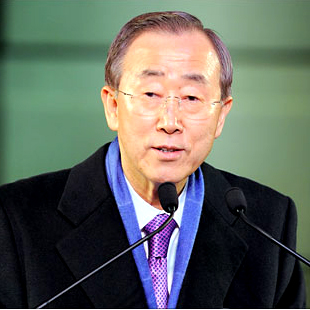The world knows how to save women's lives during childbirth and yet hundreds of thousands still die each year, UN Secretary General Ban Ki-moon said Monday at the 2010 Women Deliver Conference, DPA reported.
Some 3,000 attendees gathered for the conference on maternal health in Washington to discuss improving the situation of women as part of the UN's Millenium Development Goals.
The Bill and Melinda Gates Foundation said it would invest 1.5 billion dollars in developing countries to support the health of pregnant mothers and their children and aid family planning and nutrition.
"The world must come together to save women's and children's lives," said Melinda Gates in a press statement.
Ban called for making 2010 the turning point in improving women's health in childbirth as progress has been "too slow" since the goals were announced 10 years ago.
Ban proposed a Joint Action Plan that offers a plan to accelerate progress on women's and children's health and achieve the target of cutting the death rate by three-quarters by 2015.
The MDGs, launched by the UN General Assembly in 2000, call on governments to implement programmes in order to achieve progress on eight goals by 2015. They include halving extreme poverty, halting the spread of HIV/AIDS, universal primary education for all children and eliminating gender inequality.
"We know how to save women's lives," Ban told the conference attended by 140 countries, the largest ever so far.
"Some simple blood tests, consultation with a doctor if available, and qualified birth attendants, especially midwives, can make a huge difference," he said.
The first Women Deliver Conference was held in 2007 and has since been embraced by more organizations and governments, which built the global momentum to save the lives of millions of women and children each year.
The risk of death in childbirth can almost be eliminated if basic antibiotics, blood transfusions, a safe operating room and efficient transportation were available to women, Ban said.
He said 99 per cent of deaths during childbirth deaths happen in developing countries.
Countdown to 2015, an international scientific and advocacy movement formed in 2005 to track progress of the MDGs, said 350,000 to 500,000 women still die in childbirth each year and 3.6 million newborns fail to survive the first month.
It said an additional 5.2 million children die before the age of 5.
"Our Joint Action Plan demands that all women and children should benefit from the relatively simple, proven health practices and known technologies that save lives," Ban said.
"It asks for new commitments from everyone - governments, civil society, corporations, non-governmental organizations and international institutions," he said.
He said the plan has a framework to track progress and accountability is one of the watchwords.
For its part the UN will work to combat the world epidemic of violence against women and girls, which is a matter of moral leadership and political will for national leaders, Ban said.
"Empowering women starts at home," Ban said.
Flavia Bustreo, a medical doctor and director of The Partnership for Maternal, Newborn and Child Health, which contributed to the Joint Action Plan, said, "The solutions that save the lives of women and children are well-known and cost-effective."
Bustreo said steps that can save lives include providing access to both family planning and maternal and newborn care to all women in need in developing countries.
It would cost 4.50 dollars for each person per year and could save 70 per cent of women's lives currently lost in childbirth and 44 per cent of newborn lives, Bustreo said.






